In this #coachbetter episode, Kim chats with a panel of our absolutely amazing participants in The Coach Certificate and Mentorship Program! We have a truly global representation on this call with Karli joining from Graded American School in Sao Paolo Brazil, Ashley and Becca, both from Phoenixville School District in Pennsylvania, USA; Sharon joining from International School Tallinn in Latvia; and Ian from Anglo American School Moscow in Russia.
They have an in-depth conversation about what it’s like to be a coach, particularly on transitioning into the coaching role, challenges that coaches face, and big learning outcomes from their experience in The Coach Certificate & Mentorship program. This panel episode gives you a great insight into the kinds of colleagues you’ll meet inside The Coach and the kinds of conversations we have in the program – plus the kind of professional transformation you can make with the support of a mentor inside The Coach.
Subscribe to #coachbetter via your favorite Podcast Player!
Featured Guests
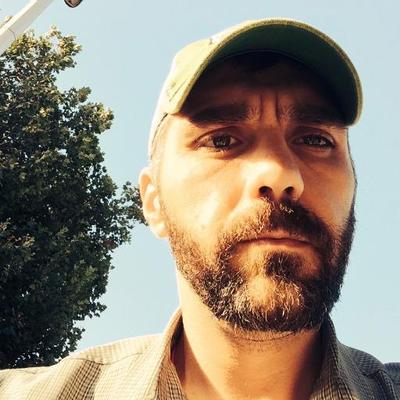
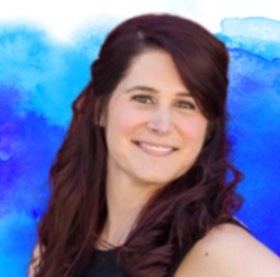
Bonus! Watch the Spotlight Version on YouTube!
Show Notes
What were your challenges before you joined The Coach?
Thinking about all of your different coaching models and the ways that you got into your coaching position, what kinds of things were you struggling with, or what challenges did you have, you know, moving into this role that prompted you to join the coach?
Karli: I’m glad that you actually asked me because I think for me, even though I had been a classroom teacher for quite a long time and, a literacy specialist in the states, I hadn’t personally had a lot of experience being coached. So as I transitioned into the role, I thought about the fact that I needed to experience having a sense of what it feels like to go through the coaching cycle and to be coached. I know it kind of sounds funny, but depending on which school I was at, at which time there weren’t always coaches there. And so I immediately thought I was really happy when I discovered, Eduro Learning and The Coach and I thought, wow, this is, this is perfect. And now, I mean, to be honest, I can’t really imagine not having my own coach, because the experience is just that rich, I think the opportunity to grow professionally is just, you know, tenfold. So that’s what appealed to me. I knew that if I were to coach other people, I needed to experience what that felt like.
Ashley: I had been fortunate enough to work with district coaches in the previous district where I taught. So I knew how impactful coaching could be. I knew that I loved working with a coach, but at my first job as a building coach, I was creating that from the ground up there. Hadn’t been building coaches before. And then after just a year of that, I moved here as a K-12 instructional coach, where it was also a brand new coaching program, starting it from the ground up. And I did not have experience with doing that. So really creating a program that had a solid foundation, a solid structure, systems in place to help us build capacity in the program, was really what I was struggling with and getting that message out to teachers, helping teachers catch the vision, because they hadn’t all had great experiences with a coach like I had, so that was really what, what drew me to, Eduro Learning and The Coach was having support and a framework to really build this program out.
Sharon: I think it’s always good when you’re moving into a new school to keep in mind that it has its own unique evolutionary pathway. I was lucky enough to work at a pretty highly functioning school for a few years and even develop the coach program when I was there and take cognitive coaching training, and even advanced cognitive coaching training. I’ve been coached, I’ve been a coach. So, you know, I knew the value of it. So when I actually applied for the job, that title was what really caught my eye, but it was a new title, a new role to the school. And after arriving here, I realized that, that there wasn’t a commonly shared agreement on what the coaching role was meant to be. They knew that they didn’t want an ed tech director. I think that’s what I’ve kind of seen, but you know, the school’s on, as I said, its own evolutionary pathway and we’re in the middle of COVID.
So to be honest, I felt very isolated and being the only person in my school, in a new country with that role. And I didn’t know anyone else who had that role probably in the country. And, and I knew that Kim was doing this program. Kim and I go back maybe, oh gosh, maybe as much as 15 years. And she was one of the ones actually that persuaded me to get into international teaching. So, I checked out the program and I thought, you know, just for the network support, that’s, that’s what I need right now. And, I was coming, returning into that role after being away for a few years. So it was really for me, sort of a refresher, very much a support.
And she has literally helped sort of help me keep my socio-emotional balance as I’ve been, in this situation of, of really, trying to introduce this role. And then for me to be aware that the role actually has many facets to it and not to be discouraged, if it doesn’t look like what it looked like at the previous place, but that there’s a space here to grow the program in a way that is customized to this context. So that’s, that’s what drew me to the program and where I’m kind of adding my thinking of how I’d like to establish a sort of culture of coaching here at the school.
Becca: I think I kind of reaped the benefits of the hard work and foundational work that Ashley put in to really put our program in place in our district. Coming in as a teacher, I felt really great in my teaching role. I knew I was a teacher leader. And then as soon as I jumped into the coaching role, I had to kind of find myself again, it was who am I as a leader, who am I as a coach in the district And the imposter syndrome really hit hard and fierce. And I think working through the program and, and talking with you, Kim really helped me identify what I was going through in that moment. And I feel like it helps me work through it a lot quicker than had I just not been a part of the program and lost in those feelings. I have found such value in having a coach mentor being a part of this program. I think that’s really helping put me in a strong place as a brand new coach in our district, and just coach in general.
Ian: My greatest challenge has already been addressed, to some degree in a sense of what the current climate and culture of coaching at the school is. And, the school has been around for a long time and it really hasn’t developed that culture at the upper-division levels. Really a lot of soul searching and trying to figure out what our vision for coaching is and what the collective vision from the teachers is. So I’ve spent the last year, I would say, just really trying to get a pulse on, on where we are now and where we need to be, where we could be, where we want to be. You just have to kind of figure out what the pulse of the, of the environment that you’ve walked into is, and then figure out, okay, how do we put the right, conditions in place to grow the program and develop what we think is really gonna move the institution forward as well as, you know, student learning opportunities
What’s YOUR level of coaching mastery?
All coaches go through various stages of coaching mastery. Once you identify where you’re at, you can begin to build the skills needed to move to the next stage.
This quiz is based on real-life case studies compiled from years of working with coaches inside The Coach Certificate & Mentorship Program!
When you receive your results, you’ll also get your matching case study from the STRIVE Case Studies to see where you fit in the stages of coaching mastery.
Ready to tackle your challenges and move on to the next level in YOUR coaching practice?

The STRIVE Model of Coaching Mastery quiz will help you identify your level of coaching mastery by matching you with case studies compiled from years of working with coaches inside The Coach Certificate & Mentorship Program so you can easily see where you fit!
When you complete the quiz, you’ll get:
- Your matching case study,
- Specific strengths & challenges aligned to your result;
- Suggested next steps for each stage;
Plus the Case Study Document includes:
- Case studies leveled by coaching mastery;
- A framework to identify essential stages of professional growth & key areas to focus on in your professional learning;
- Alignment with the THRIVE Model for a Successful Coaching Culture;
- Space for you to reflect & prioritize so you can take action immediately!
You’ll go straight to the Quiz, and get the Case Study Document via email
Show Notes continued…
What’s been a big “aha” moment or takeaway from The Coach?
Ian: Three key words for me, messy is okay. I feel like we may never get to a point w where the coaching is completely cyclical or, or it feels a hundred percent purposeful. The messy works as long as we continue to use the coaching strategies and language in conversation in meaningful ways, that are supporting all teaching and learning processes. I’ve, I’ve often waited for the right conditions to exist to try and move things forward. One of the things that working with the program here has helped me to realize is that we may never get there. And that’s absolutely okay. As long as we just continue to be repetitive and use consistent language and process that folks can rely upon.
Becca: My biggest takeaway from the program so far really has come from our one-on-one conversations. I came into this role and I was trying to fill someone else’s shoes, so really working through how to not only figure out the role in its own, but kind of make it my own and really define who I am as a coach. And that’s something that I am so thankful for and looking to continue to kind of develop along the rest of the journey and the program.
Sharon: Understanding that having multiple roles, having a different experience almost every day of what your role is trying to accomplish, it really resonates with me. As well as the fact that having that mentoring conversation just really saved my sanity and maybe thinking, you know, it’s okay if it’s not what it was in a previous iteration or a context it’s the movement forward. It really helped me move from very, very pessimistic and discouraged. So I think I’m swiveled the 180 the other way now
Ashley: My biggest takeaway, like Becca said, the one-on-one coaching mentoring has been incredibly beneficial, and creating a program that really identifies teachers needs and creates intentional coaching opportunities. We work together to really look at how to take this K-12 coaching, where there are so many different needs and really focus in our work to make it more intentional, more aligned with teacher needs, and developing, (like we developed this coaching menu that we put out every month for teachers giving them all different ways that they can connect with a coach connect with PD) and then really working together on how to make that PD engaging, meaningful, motivating, and having that time to develop it. I’ve come to meetings with Kim and say, okay, here’s an idea, and this is the part I’m struggling with, and having that thought partner to talk it out and then leaving feeling. I would often say in meetings that I would come in like a little unsure of where I even wanted to start, and by the end of the meeting, feeling so energized and excited to go do the work the next day.
Karli: This is so hard because I have so many takeaways and I think what everyone has said definitely resonates with me. I think about the way that the coach is structured and the fact that every module you have the opportunity to learn and then go apply in your own personalized setting, and then go back and reflect on that application. It’s so incredibly valuable. I think in doing that process, letting go of the perfection, taking off the teacher hat and really being vulnerable to put on the student hat, in the discussion boards and the responses through the course, really just being honest and not trying to reflect on what you think the right answer is, but really personally, what was my learning. As a new coach, I felt like a first-year teacher all over again, so for me, one of the most valuable things was reflecting on those opportunities to apply strategies that I learned from the modules and noticing, wow, I, I didn’t have that skill. I practiced it. I learned it. I’m growing. You know, the messy is good and it’s not a straight line. I just need to keep going with that. so tremendously valuable learning.
Kim: Thank you. Thank you all for those wonderful statements about the coach. And I’m so glad that you have each had enough of a unique experience, that everybody said something different, but it all shows the same kind of learning environment that is personalized and unique and customized to you with that personal touch of that mentor interaction. Because I just had another conversation with somebody else. I just think the personal relationships, the personal conversation, the opportunity to reflect the idea that it’s about your learning and not about getting the right answer. Those are things that I want to see in all educational experiences and when educational experiences aren’t like that. I get very frustrated because I know that it is possible because we’re doing it here. So to hear you all echo, that is absolutely fabulous. Thank you. Thank you. Thank you for your time today. Thank you for sharing your insights and your experiences.
Level Up Your Coaching with The Coach!
If you are ready to develop your coaching practice over the next academic year, and explore topics like transitioning your work from individuals to teams, please join us for our next cohort of The Coach!
Wherever you are in building a coaching culture in your school, The Coach will give you the strategies, skills and tools you need to make coaching a success and will empower you to confidently apply instructional coaching strategies in any situation – from building a coaching program, to having coaching conversations, to being a leader in your school community. We facilitate only one cohort each academic year so we can offer individualized support for each participant.
Registration for our next global cohort opens once a year – check the website for details!
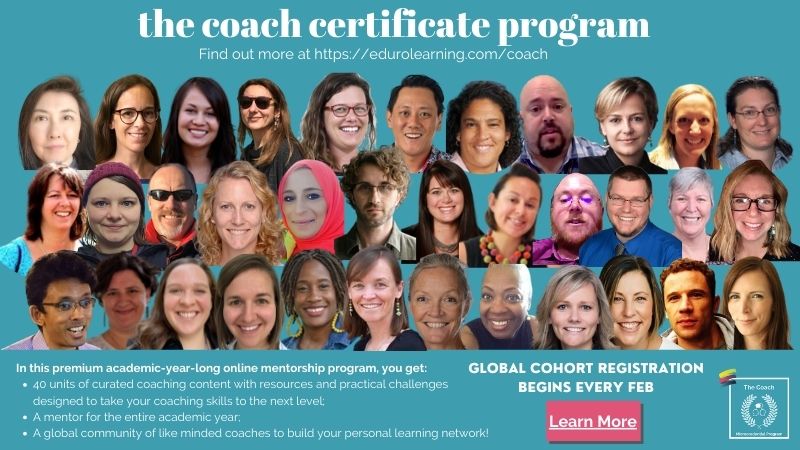
Find out more at: https://edurolearning.com/coach/





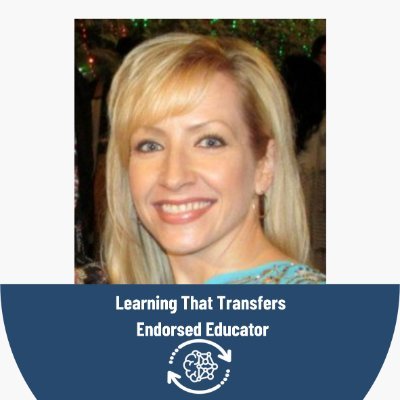
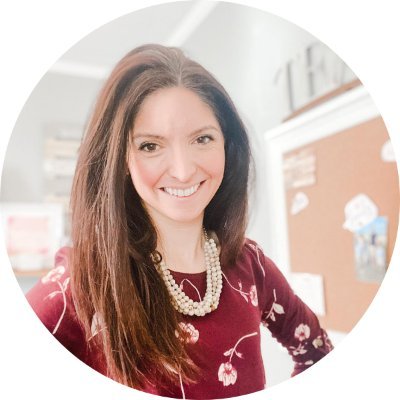
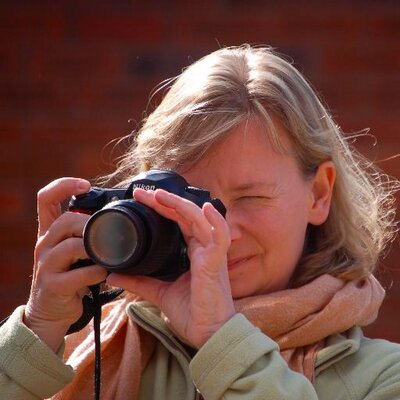
Recent Comments